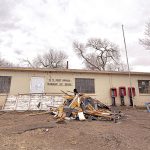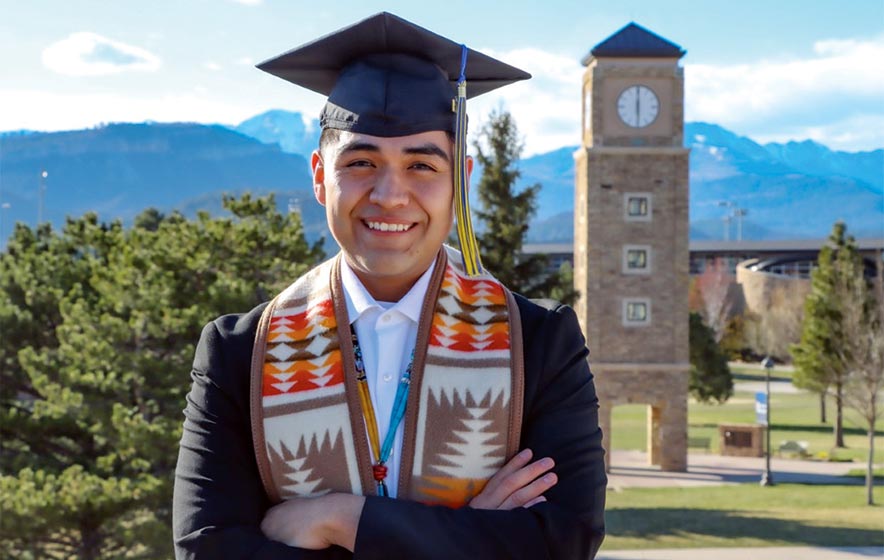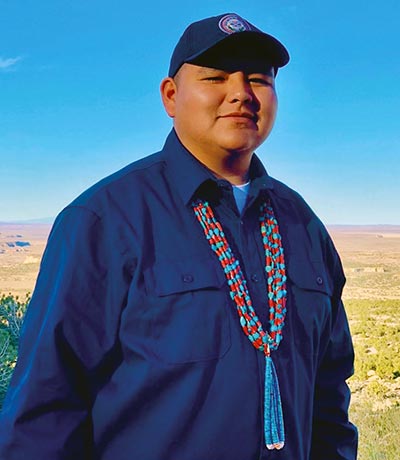
A seat at the table: NM hosts first-ever indigenous youth summit

Courtesy photo
Ian Teller, Diné, a recent graduate of Fort Lewis College, is the most recent member of the Indigenous Youth Council.
By Colleen Keane
Special to the Times
ALBUQUERQUE
“Make no mistake, your state needs you and respects you!” Governor Michelle Lujan Grisham told tribal youth during the opening session of the first-ever indigenous youth summit held via Zoom June 11 and 12.
“Your long-held spiritual values and traditions, the recognition of your ancestors and role of your elders,” along with knowledge preserved through storytelling, are essential to New Mexico’s history, she said enthusiastically.
“Far too many New Mexicans don’t have the cultural values and belief system that connects the past and the present in what we are trying to achieve (for the state) in the future,” she added.
The summit, titled “Community Resilience: Nurturing and Protecting Youth Wellness,” was hosted by the newly formed Indigenous Youth Council, the state’s Indian Affairs Department and community partner Honoring Native Life.
Honoring Native Life, housed in the University of New Mexico’s Department of Psychiatry, provides training and resources to fight suicide.
The program supports the resiliency of tribes, nations and Pueblos across New Mexico, according to director Teresa Gomez, Isleta Pueblo.
Two youth council members are from the Navajo Nation – Triston Black and Ian Teller.

Courtesy photo
A graduate student at Arizona State University, Triston Black, Diné, is one of the Navajo Nation representatives on New Mexico’s seven-member Indigenous Youth Council.
Black graduated from Diné College with a bachelor’s degree in Diné Studies in 2020. He is a graduate student at Arizona State University majoring in Indigenous education.
Teller recently graduated from Fort Lewis College with a bachelor’s in business administration. He plans to continue his studies at the University of Southern California pursuing a master’s degree.
As council members, Black and Teller will reach out and engage Native youth knowing they have the support of the governor.
“We are very blessed to have her with us,” Black said.
“That is so exciting hearing from (the governor) directly and hear the sincerity in her voice,” said Teller. “It is a big inspiration and motivation to have a direct line of communication on indigenous issues to leadership.”
This is the first time in state history that indigenous youth have a seat at the table within earshot of the governor. New Mexico became a state in 1912, 109 years ago.
The inaugural Indigenous Youth Council and summit grew out of two listening sessions organized by the IAD earlier this year.
Access to higher education, behavioral health and mental health services, especially in the aftermath of the COVID-19 pandemic, are at the top of the list of issues tribal youth want discussed.
Teller added services need to reflect indigenous cultures and values.
“Western society has to understand that we don’t conform to dominant ideologies and philosophies,” he said. “We need opportunities for traditional counseling. We have to have connection to our culture and religion. That is something we look for and we yearn for.”
Teller noted that besides dealing with the impact of the pandemic, Native youth struggle with historical trauma, loss of language, culture and identity.
“(This all) contributes to the overall issue of mental well-being,” he said.
Participants also voiced the desire to have more intertribal connection between nations, tribes and Pueblos in the state, according to an IAD press release.
Indigenous Youth Summit
Black opened the summit with a blessing.
“We’re asking the Holy People for guidance, protection, everything we need to nourish ourselves across Indian Country,” he prayed.
Assisting with the rollout of the summit, Gomez said, “We (Honoring Native Life) listened closely to the (youth council) and designed a program filled with tools and resources addressing mental health and well-being.
“We are continuing to come up with innovative (programs),” she said. “The indigenous Youth Summit is just one example of those innovations.”
Among the many topics were skill building, relationship building, physical activity and self-care.
Black said it was especially helpful to hear the self-care message – “Don’t forget to take care of yourself in all you do for your tribe, family and community.”
Lexie James, Tewa-Hopi, the current Miss Native American USA, was one of the presenters. and extended her support to tribal youth.
“You are precious to us,” she said. “I want to remind you how special you are and how amazing, resilient and strong you are!”
James has been a long-term advocate for mental health wellness and suicide prevention.
“It’s something that needs to be talked about,” she said. “Sometimes just a little conversation will help.”
Lynn Trujillo, IAD cabinet secretary, said, “Please continue to talk about mental health with family friends and community. Reach out to your elders, leaders and family. Through our culture and language, we will begin to heal.”
Throughout the summit, youth were asked for their input on issues, needs and concerns impacting them, their families and communities.
Teller said the next step is putting their recommendations into a report to the governor.
“You have my commitment that your recommendations will not fall on deaf ears,” promised Lujan Grisham.
“Leadership (both tribal and state) talking to us and encouraging us; we feel confident moving forward,” Black said.
“It’s exciting!” Teller said. “There will be more opportunities for Native youth. It’s possible when support comes so far up in leadership.”
Responding thoughtfully to all she heard, James commented, “It’s amazing what happens when you put young indigenous minds together who want to create change for the better.”
Besides Black and Teller, the other members of the IYC are Jeremy Begay, Mescalero Apache; Alysia Coriz, Kewa; Shayna Naranjo, Santa Clara; Trinity Roybal, Pojoaque; and Kaylee Wood, Jicarilla Apache.
Information: nmiad.gov and Honoring Native Life on Facebook.








 Highway 264,
Highway 264, I-40, WB @ Winslow
I-40, WB @ Winslow